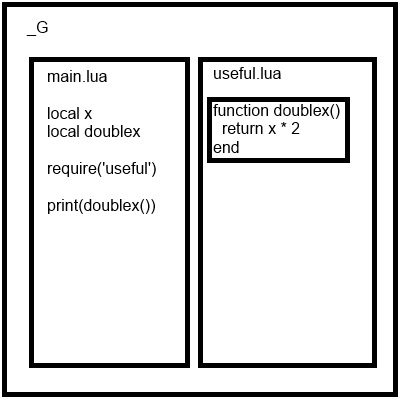I keep reading everywhere that local variables are a million times better than globals. But my problem is that when a project is starting to get bigger, or is designed to get bigger in the future, I just don't know how to use them anymore.
I like to declare a bunch of tables in main.lua, outside any function, just at the top. I can make them all local and they can be accessed anywhere in main.lua then. But when I add code in a separate file and require or love.filesystem.load them into main.lua, they're all useless.
For example, I have a game with a couple of different levels. Every level I have in a separate lua file, and require it into main.lua whenever needed. But then I cannot access my local player.x and player.y variables in the level files anymore. Of course I can pass these as arguments, but that's going to be a long list of arguments. In love.keypressed, I would then have something like:
Code: Select all
function love.keypressed(key, unicode)
if game.state == "level1" then
level1.keypressed(key, unicode, player, mouse, window, colour, timer, flags, fade, volume)
end
endIs there no way around this? Why does Lua even behave this way? To me, this:
Code: Select all
local x = 5
local function doublex()
return x * 2
end
print(doublex())Code: Select all
--main.lua
local x = 5
local doublex
require 'filewithlotsofusefulfunctions.lua'
print(doublex())
--filewithlotsofusefulfunctions.lua
function doublex()
return x * 2
endSo, what do I do? Just screw it all and use globals anyway, because they're a million times easier to use (and seem to have no negative impact on FPS either, and as I often read: don't optimise unless you have to), or bend my spine in 5 directions, because locals are 'better'?
